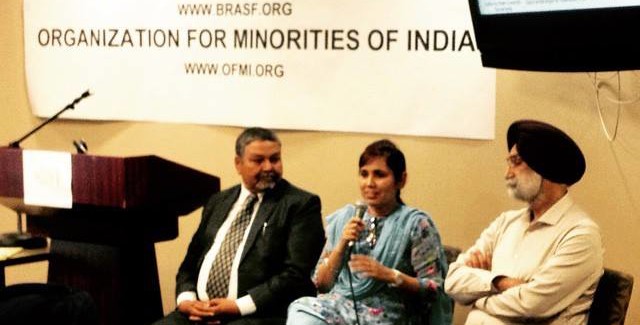Seminar in Central California Urges Sovereignty of Indians in Eradicating Caste Practice
“Hinduism is nothing but a tool for propagation of caste,” says Mulnivasi Sangh vice-president
Stockton, CA: Apr. 4, 2015 – Over 75 people gathered in Lathrop, a small town in Central California, on March 29 to hear Dr. Manisha Bangar discuss what she termed the “contradiction between what is the ideal and what is the existing reality” in India today.
Dr. Bangar was joined by Mohan Ram Paul and Dr. Amrik Singh in speaking at the March 29 seminar on “The Journey From Tortures and Tribulations of Caste Discrimination to the Glory of Begampura.” The three speakers repeatedly emphasized that philosophical structures of supremacism undergird social systems of oppression like caste. Speaking as vice-president of Mulnivasi Sangh, an advocacy group for the indigenous inhabitants of India who are considered by the Hindu caste system as low-caste, Dr. Bangar concluded: “Hinduism is nothing but a tool for propagation of caste system and inequality.”
Speakers were enthusiastically greeted by a diverse audience of South Asian diaspora and native American communities who traveled from as far-flung regions as Sacramento, San Jose, Fresno, Roseville, and Stockton. The seminar was hosted jointly by the Bhim Rao Ambedkar Sikh Foundation (BRASF) and Organization for Minorities of India (OFMI). Bhajan Singh, who serves on the board of both organizations, stated: “This collective effort among communities is a model for the collaboration necessary as we work to creatively unite coalitions of the oppressed so we can stand against sociopolitical totalitarianism.”
As international coordinator for BAMCEF, M. R. Paul spoke briefly about the caste structure, including ways it is enforced by Hindu supremacist social group Rashtriya Swayamsevak Sangh (RSS). Following was a short lecture by Dr. Amrik Singh, a professor of ethnic studies at Sacramento State University, about modern Hinduism’s connections to the Western theosophical philosophy. The keynote was Dr. Bangar, who spoke extensively on the absence of and need for individual sovereignty in Indian society.
“Howsoever political revolutions or political change may be important, it is the social revolutions which transform society and which give you the real power,” said Bangar, a gastroenterologist from Hyderabad. Asserting that the Sikh nation’s original intent was to offer people sovereignty, she claimed: “This has been totally subverted. Hinduization and Brahmanization of the Khalsa Panth and the Sikh Panth has become a major problem in Punjab and all over the world.” Explaining how caste is often practiced by Sikhs and other non-Hindus, she warned: “There is the presence of Brahmanism within us.”
Alerting her audience to the rising affliction of drug and alcohol addiction in Punjab, Dr. Bangar said, “Punjab, and the Sikh nation, is being infested by economic over-development and human under-development. This is the major contradiction.” She gave as an example the “Special Economic Zones,” areas developed by multinational corporations through collaboration of State and Central governments in India. Citing the epidemic of farmer suicides in Maharashtra, Madhya Pradesh, Telangana, Andhra Pradesh, and Punjab, she suggested these as evidence of the failure of a state-managed economy.
Dr. Bangar swiftly identified both the perceived problem and solution, arguing the separation between the ideal and reality occurs “Through subversion of your ideas. Through sabotage. By infiltration. Through ruling your minds.” Sovereignty is the solution, she said, but noted: “Political sovereignty comes through spiritual and mind sovereignty.”
Among those applauding the speakers was OFMI coordinator Steve Macías, who said, “I was impressed by Dr. Bangar’s message of unity and peace. Her remarks urged our communities to work together, setting aside differences for the cause of liberty. It is inspiring to see her moral courage despite facing adversity in India. Her words remind us how careless we, as Americans, are with the manifold liberties we currently possess and how easily they can be taken away.”

